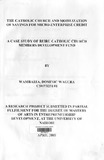| dc.description.abstract | This study was about the role of the Catholic Church in the mobilization of savings
for the Development of micro-enterprise credit. The study was meant to establish
the role the religious organizations can play in uplifting the living standards of the
poor members of the society. The church must be in the frontline in terms of
fighting poverty. In the Old Testament we are told "if one of your kinsmen in the
community is in need in the land which the Lord, your God is giving you, you should
not harden your heart nor close your hand to him in his need "Deut. 15:7. The
presence of the poor would be against the vision of prosperity promised by God to
the entire people. Therefore, the church has the cardinal duty to cater for the
physical needs of the faithful. However, resources are scarce and therefore it is not
possible to ditch them out for free and hence the need to facilitate the borrowing
and lending of financial resources.
The study therefore attempted to establish the savings-motivating factors that
attract people to save and borrow from a church based organization. The study was
also meant to establish whether all people who save with the Ruiru Catholic Church
Members Development Fund (RCCMDF) put into proper use the funds borrowed.
Havethe loans borrowed made any impact to the lives of Fund members?
The research was conducted at Ruiru Municipality about 27 Kms North of Nairobi. A
sample size of 90 respondents was drawn using multi-stage cluster sampling
procedure and information was obtained from respondents through the use of
interviewschedules. The data analysis and presentation entailed the use of tables
frequenciesand percentages.
Concerningthe social characteristics of the respondents the study found that majority
of the RCCMDFmembers 74.44 % were aged between 31 and 50 years. Nearly
8% out of the respondents were aged between 51 - 60 years while only 1 (2%) was
over 60 years old. The study also found that 17(18.8%) had some primary
education, 59(65.6%) had secondary education and 10(11.1%) had some college
level of education. The same community was also benefiting from the entrepreneurs
set up after getting the loans from the fund through getting the jobs created
therefrom.
Most of raw materials used by the entrepreneurs were sourced from the local
community.
In view of the findings the study gave the following recommendations among others.
1. Training the entrepreneurs on business management, bookkeeping and
marketing skills should be introduced.
2. Proper usage of savings services in respect to providing capital reservoir for
onward-lending, developing the borrowers (clients) base for the future use in
areas like evaluation the credit worthiness of the borrowers among others.
3. Promotion of the micro- enterprise vertical growth through training in various
businessaspects.
4. The RCCMDFshould be encouraged to graduate into a village bank.
5. Loan repayment and guarantee policies should be reviewed with a view of
making them more friendly and in conformity with the modern loaning
systems. | en |

